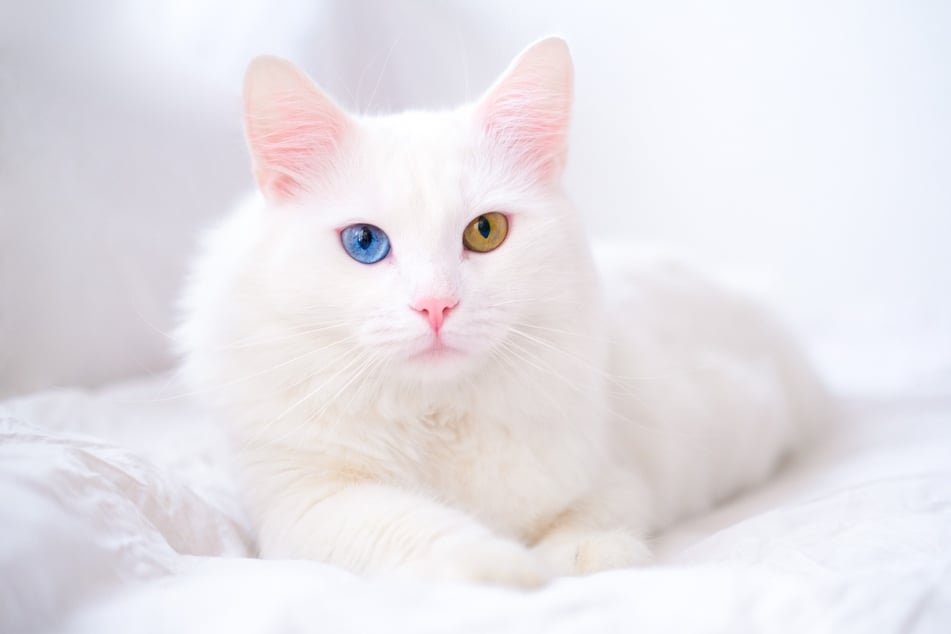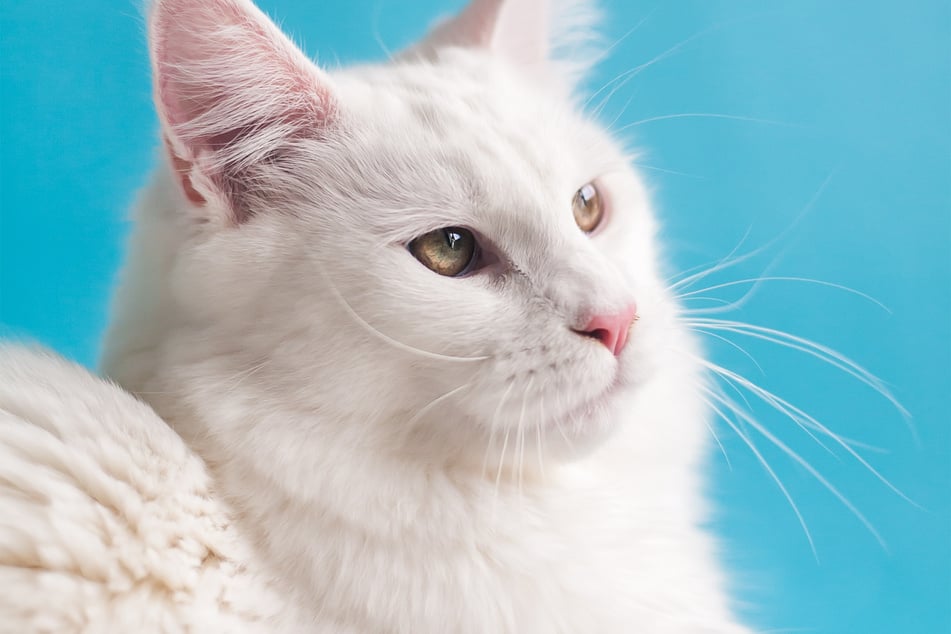Are white cats deaf?
White-furred kitties are some of the most noble and elegant creatures to ever grace our living rooms, but are they as deaf as people think they are? Are white cats deaf, or is it all just a myth?

No matter how far we advance as a society, there will always be those unfounded and bizarre rumors.
As cat lovers and fans, it's our job to correct those myths and find the answers we all crave.
One such rumor is that all white cats are deaf. Unsurprisingly, the truth is a little more complicated than many would lead us to believe.
In this cat guide, TAG24 takes a look at whether white cats are deaf. Are white cats deaf, or is it a myth? And if there's a little truth to the madness, why do they have such trouble hearing?
Let's turn up the volume and dive in.
Are white cats deaf, or is it just a myth?
There's a common and often unquestioned belief that white cats go deaf very easily and very quickly, losing their hearing and existing entirely off of sight and smell. While it may seem like a broad generalization, and it largely is, this is one myth that is unusually close to the truth, and not quite as off-based as you'd think.
While not every white cat suffers from acute deafness, some genetic traits and characteristics associated with white kitties are linked to deafness. Indeed, research shows that around 17-22% of white cats are born deaf.
It seems, however, to be linked more with the eye color of each white cat than with fur itself. White cats often have two different eye colors, and those eye colors, specifically the color blue, directly relate to the risk that they will go deaf. The previously stated statistic only relates to white cats that are born with two non-blue eyes - when we start talking about blue-eyed kitties, that number goes way up.
When a white cat is born with one blue eye and one differently colored eye, their chance of deafness goes up to around 40%. It only increases from there too: The chances of deafness when a white cat has two blue eyes goes up to between 65 and 85%.
As a result, it is pretty safe to say that white cats with blue eyes have a predisposition towards deafness, and that it is not a myth at all. What's important to note, though, is that the majority of deafness in cats is the result of exterior factors and injuries rather than the color of their eyes or fur.
You shouldn't worry too much, though, when adopting a white cat. Signs of deafness will generally appear mere days after a cat is born, meaning that by the time you adopt such a kitty, you will know its situation and needs.
Are all white cats deaf?
Not every white cat is deaf. In fact, the majority of white cats can hear perfectly fine. The risk of deafness is purely associated with the cat's eye color due to certain genetic characteristics and risks that come along with blue eyes in white cats. If you have a non-white or non-blue-eyed cat who's deaf, it is unlikely to be caused by a factor such as this.
What percentage of white cats are deaf?
As we revealed, around 20% of white cats with non-blue eyes are born deaf, while blue-eyed white cats rise to a whopping 85%. While this seems extreme, white cats only make up about five percent of the overall cat population, and blue-eyed white cats make up a little over 15% of those white cats.
This means that your cat's chances of developing congenital deafness are pretty slim, due to the fact that very few cats are white and very few white cats have blue eyes. In the end, your cat is more likely to go deaf due to environmental factors or damage to its ears.

Signs of deafness in cats
If you want to get your cat's attention, the first thing you can do is teach it the name you've chosen. To do this, you obviously need your cat to be capable of hearing. Considering the fact that you won't name it immediately, and likely until it is clear that your kitty has good hearing, it would be worth looking out for the signs and symptoms associated with cat deafness.
The signs and symptoms of cat deafness include the following:
- Disorientation
- Dizziness
- Failure to respond to noise-based stimuli
- Longer and deeper sleeps
- No fear of loud noises
- Easy to startle
- Constant scratching of the ears
- Shaking of the head
- Nasty discharges from the ears
- Unpleasant smell in the ears
- Loud meowing or muteness
- Increased affection
- Increased touching
Deaf cats will be significantly cuddlier, as they no longer have the ability to communicate through sound. Instead, they will use physical touch and body language to talk with their owners.
Why are white cats deaf?

White cats with blue eyes go deaf more commonly due to a condition called inherited congenital deafness that causes the deterioration of their inner ear auditory apparatus. Studies have shown that this is due to the same gene that causes cats to be white with blue eyes.
It's what's called a pleiotropic gene, meaning that it has more than a single effect (causing both white fur and blue eyes). The problem is that while the gene determines the color of your cat's coat, it doesn't necessary determine both the development of its eye color and ears. It seems that as the penetrance grows in terms of eye color, it increasingly impacts the development of the ear.
This is why not all white cats are deaf, but many white cats with blue eyes are deaf. As the gene grows in intensity, blue eyes develop, but that same intensity then has a negative impact on hearing.
Important note: This is a complicated biological topic that we have narrowed down to its most simple and easy-to-understand form. Please keep in mind that this is a far more complex topic if you'd like to delve in deeper.
Are any other cats likely to be deaf?
While it is possible for any cat to go deaf, white cat breeds are the most likely to develop deafness, and it is very rare in other cat breeds. This is a good thing, as cats use their hearing for many different things, and deafness seriously disables a cat's ability to go about its everyday life in a safe and enjoyable way.
So, while white cats are remarkably beautiful and incredibly cute - and not all of them are deaf - it may be a better idea to adopt a different colored kitty. After all, there are plenty of beautiful cat breeds out there ready to be adopted! And if not, treat your white kitty with care!
Cover photo: 123rf/nataliakuzina




